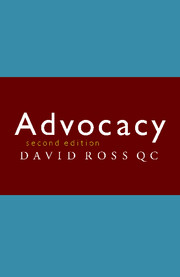Book contents
- Frontmatter
- Contents
- Foreword
- 1 The nature of advocacy
- 2 Preparation
- 3 Witnesses and questions
- 4 Examination-in-chief
- 5 Cross-examination: its qualities
- 6 Cross-examination: method and style
- 7 Cross-examination of experts
- 8 Cross-examination on documents
- 9 Re-examination
- 10 Admissibility, objections and submissions
- 11 The addresses
- 12 Plea in mitigation
- 13 Appeals
- 14 Legal writing
- 15 Etiquette and ethics
- Index
1 - The nature of advocacy
Published online by Cambridge University Press: 31 January 2011
- Frontmatter
- Contents
- Foreword
- 1 The nature of advocacy
- 2 Preparation
- 3 Witnesses and questions
- 4 Examination-in-chief
- 5 Cross-examination: its qualities
- 6 Cross-examination: method and style
- 7 Cross-examination of experts
- 8 Cross-examination on documents
- 9 Re-examination
- 10 Admissibility, objections and submissions
- 11 The addresses
- 12 Plea in mitigation
- 13 Appeals
- 14 Legal writing
- 15 Etiquette and ethics
- Index
Summary
The essence of advocacy
[1000] Advocacy is winning cases. Nothing more and nothing less. It consists in persuading a court to do what you want. The court may have serious misgivings, but the good advocate gives it no choice.
[1005] Victory depends on the sort of case and its strength. Can a plaintiff recover more than the payment into court? Is the contract valid and binding? On a murder charge, can you get a verdict of manslaughter?
[1010] Advocacy is important in a wider setting. As McHugh J said, “Advocacy in the courts is a unique profession. Advocates play an indispensable part in the administration of justice.”
[1015] Court work involves the advocate in all sorts of duties. You must do everything legal to win your client's case. You must keep up to date with the law in your field of practice. You must not mislead the court. You must not cross-examine falsely or lead evidence that you know to be untrue. Your private life does not have to be totally without blemish, but of course you must never commit a crime. Honourable does not mean virtuous.
The qualities of advocacy
[1020] Advocacy is a craft. Like every craft it can be learned. The techniques have to be acquired, practised and constantly honed. The competent advocate can employ these techniques, but the good advocate is a master of them and moves beyond the craftsmanship that you need in any court appearance.
- Type
- Chapter
- Information
- Advocacy , pp. 1 - 10Publisher: Cambridge University PressPrint publication year: 2007

